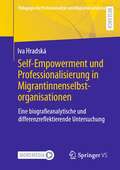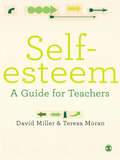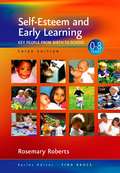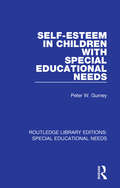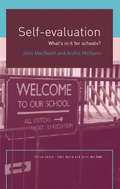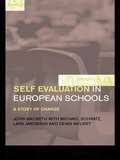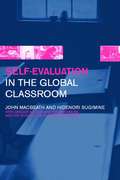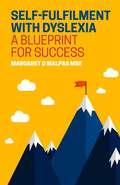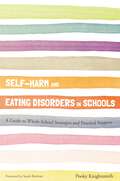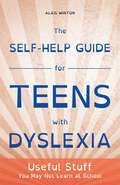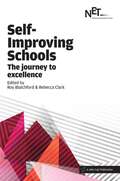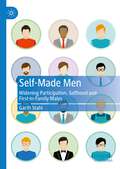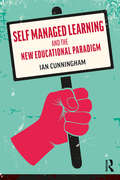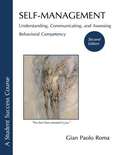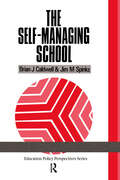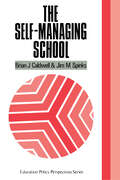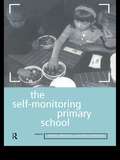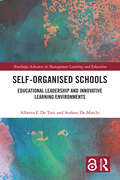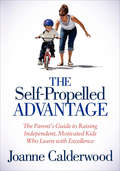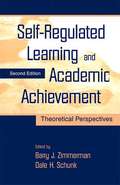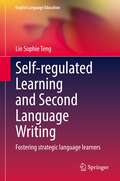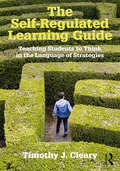- Table View
- List View
Self-Empowerment und Professionalisierung in Migrantinnenselbstorganisationen: Eine biografieanalytische und differenzreflektierende Untersuchung (Pädagogische Professionalität und Migrationsdiskurse)
by Iva HradskáDas Forschungsinteresse dieser Studie richtet sich auf das Zusammenspiel von Biografie und Professionalisierungsprozessen von Akteurinnen in Migrantinnenselbstorganisationen (MSO) bei der Ausübung ihrer Bildungs- und Beratungsarbeit. Es werden drei Fallanalysen mit markanten Innenansichten präsentiert. Als Ergebnis werden drei Muster vorgestellt, die auf unterschiedliche Herstellungsprozesse biografischer Passungsverhältnisse individueller undorganisationaler Professionalisierung und Self-Empowermentstrategien der Akteurinnen verweisen. Die Muster zeigen, dass die Akteurinnen eine bestehende dynamische Wechselbeziehung zwischen der ausgeübten Tätigkeit und den Interaktionsressourcen aus ihren Migrationsbiografien zu nutzen und individuelle Lösungs- und Bewältigungsstrategien bei der Professionalisierung und Etablierung der MSO anzuwenden vermögen. Die priorisierten Zielverständnisse ihrer Tätigkeit unterscheiden sich entlang der drei ausgearbeiteten Muster: die Möglichkeiten die gesellschaftliche Partizipation von Migrantinnen zu erhöhen, Selbstverwirklichung der Migrantinnen zu unterstützen und migrations- und geschlechtsbezogene Exklusionsprozesse zu minimieren.
Self-esteem: A Guide for Teachers
by David Miller Teresa MoranDo some of your pupils suffer from low or fragile self-esteem? Perhaps you want to help, but don′t know how? If so, this book is for you. Using insights from theory, research and classroom practice, it provides strategies and techniques that will enhance the confidence of primary school children through authentic learning experiences. This book includes: -discussions on a range of issues surrounding self-esteem enhancement in school -studies of recent work in this area -links between self-esteem and the development of competence (fitting in with the Raising Attainment agenda) -research evidence from real primary classrooms -a clear articulation of strategies and techniques to use in classrooms -a summary and analysis of the key theoretical and empirical work in the area The book′s clear practical focus will be of interest to all teachers and managers keen to enhance self-esteem in their schools. It will prove equally useful for teachers in training and more experienced teachers undertaking further study. This book will empower you to develop your practice with a clear sense of direction - and with increased confidence. David Miller is Professor of Education at the University of Dundee. Teresa Moran is the Associate Dean (Education and Professional Development) at the University of Dundee.
Self-Esteem and Early Learning: Key People from Birth to School (Zero to Eight)
by Dr Rosemary RobertsFocusing on the period from birth to school, this book is about babies' and young children's feelings, their learning; and the ways in which the adults in their lives can support their emotional, social and cognitive development. Looking at the perspectives both of the child and the adult, it presents thought-provoking ideas and questions on how adults can make the most of opportunities to support the children with whom they live and work. A story, in episodes embedded throughout the book, makes this an accessible and enjoyable read. In this third edition, there are new and updated chapters on: * Young children's transitions, with a particular focus on starting school * Young children's positive 'learning dispositions' * Brain research and its possible implications * Further reading, signposting some enchanting children's books as well as important new texts. The book explores the basis of the 'key person' relationship, looking at attachment 'in practice', and linking developmental issues with the early development of self esteem. Written for students on early childhood courses and staff in early childhood care and education settings and integrated Children's Centres, the book will also be of interest to parents and carers.
Self-Esteem in Children with Special Educational Needs (Routledge Library Editions: Special Educational Needs #28)
by Peter W. GurneyFirst published in 1988. The mounting concern in schools over widespread failure in academic achievement, greater disaffection in children and the lack of confidence in many school leavers are highlighted by the difficulties experienced by children who have special educational needs. Within this group the importance of the child’s evaluation of him or herself – i.e. self-esteem – is a neglected issue. This book investigates how the level of self-esteem appears to influence social behaviour and school performance in children with special educational needs. It discusses the practical steps that can be taken to assess and enhance self-esteem in children with special needs and evaluates their effectiveness. The author emphasises the discrepancy between the performance of children who have special educational needs in ordinary classrooms with that achieved in special settings. He argues that the negative impact on a child’s self-esteem created by placing him/her in an ordinary classroom may outweigh the benefits of greater integration. A full and informative treatment of both the theoretical and practical implications of a neglected subject, this text book is suitable for experienced special educational needs teachers and those undergoing teacher training, as well as psychologists with an academic interest in the self-concept or a professional involvement in assessing children.
Self-Evaluation: What's In It For Schools? (What's in it for schools?)
by John MacBeath Archie McglynnSelf-evaluation in schools sits at the top of the national agenda in response to an awareness that performance tables and inspector's reports can only tell a partial story. Schools are now encouraged to raise questions about 'How are we doing?' and 'How do we know?'. Self-Evaluation: What's in it for Schools? demystifies school self-evaluation and encourages schools to be self-critical and self-confident. The book helps schools and teachers develop the necessary confidence to work with evaluation tools. Accessible and packed with case studies, it tackles the issues that are at the forefront of the national agenda in most countries in Europe. Challenging ideas for the future are given through discussion of the concerns and issues of schools in the present day.
Self-Evaluation in European Schools: A Story of Change
by Lars Jakobsen John MacBeath Denis Meuret Michael SchratzIn a political and economic climate in which school performance is made public, performance tables and inspectors' reports can only tell a partial story.This is a unique book. It tells the story of one school seen through the eyes of a pupil, a parent, a teacher, a headteacher and a critical friend. The story is a compelling journey through the process of school improvement; theories of school effectiveness and school improvement are progressively clarified.This book is based on a well-known and well-documented research project that represents eighteen European countries, which clearly sets it in a European Policy context. It includes a wealth of practical tools for raising standards for teachers and school managers to refer to, and guidance on how to use them.This eagerly awaited follow-up to Schools Must Speak for Themselves by John MacBeath (RoutledgeFalmer 1999) is a vital and useful source of good ideas, challenging insights and practical strategies for real schools.
Self-Evaluation in the Global Classroom (What's In It For Schools? Ser.)
by John MacBeath Hidenori SugimineSelf-evaluation is going global. This book describes what happened when teams of school students from across the world embarked on the trip of a lifetime to explore the school lives of their international contemporaries.The students involved in The Learning School project used a variety of tools to evaluate the learning, motivation and self-evaluation abilities of school students in the UK, Sweden, Japan, Germany, the Czech Republic, South Africa and South Korea. From the easy freedom of the Swedish school to the highly structured day in the Czech Republic, this study shows that success and effectiveness in education really is in the eye of the beholder.The results of this study have significant implications for school leaders and managers, policy makers and academics, and all those concerned with school improvement. This lively and accessible book makes intriguing and important reading, raising fundamental questions about how we judge quality and effectiveness in teaching and learning.
Self-fulfilment with Dyslexia: A Blueprint for Success
by Margaret MalpasDyslexia won't stop you from writing your own success story. Discover the ten key traits which people with dyslexia have harnessed in order to reach success and self-fulfilment. Dyslexia brings both challenges and the potential gift of a unique skill set - through a combination of academic research and case studies, this book shows how you can use all of this to your advantage. From increasing your self-esteem to imaginative problem solving, each of the ten secrets to success is explained and brought to life through interviews with accomplished people describing how they have profited from a single star characteristic in realizing their goals. Approach the obstacles of dyslexia pro-actively, and unlock your potential with this inspiring step by step guide. Royalties from the sale of this book will be donated to the British Dyslexia Association.
Self-Harm and Eating Disorders in Schools: A Guide to Whole-School Strategies and Practical Support
by Pooky KnightsmithSelf-harm and eating disorders are present in almost every school and they frequently co-occur. This book provides the vital guidance that school staff need to spot early warning signs, understand triggers and support the students in their care effectively.This very practical guide helps educational professionals to gain a better understanding of self-harm and eating disorders by dispelling the myths and misconceptions that surround these behaviours. The book provides advice on whole-school policies and procedures as well as day-to-day strategies to implement in lessons, at mealtimes and in one-on-one sessions. It explains how to respond to disclosures, make referrals and work alongside parents to assist in the road to recovery.
Self-Harm and Eating Disorders in Schools: A Guide to Whole-School Strategies and Practical Support
by Pooky Knightsmith Sarah BrennanSelf-harm and eating disorders are present in almost every school and they frequently co-occur. This book provides the vital guidance that school staff need to spot early warning signs, understand triggers and support the students in their care effectively. This very practical guide helps educational professionals to gain a better understanding of self-harm and eating disorders by dispelling the myths and misconceptions that surround these behaviours. The book provides advice on whole-school policies and procedures as well as day-to-day strategies to implement in lessons, at mealtimes and in one-on-one sessions. It explains how to respond to disclosures, make referrals and work alongside parents to assist in the road to recovery.
The Self-Help Guide for Teens with Dyslexia: Useful Stuff You May Not Learn at School
by Alais WintonAs Alais Winton knows, having dyslexia doesn't mean you're not bright; like her, you might just need a different way of looking at things. In this book, she lets you in on the learning techniques which work for her, and which you may not be taught at school. Offering solutions to common problems students with dyslexia face, Alais describes tried-and-tested techniques for succeeding with reading, spelling, memorising information and time management, and even a simple method to ensure you never misplace your learning tools (such as pencils and books) again. The strategies are ideal for use in the run-up to exams, helping you to become more organised, less stressed and better prepared. This is a must-read pocket guide for students with dyslexia aged 11 to 18, and will also be a helpful source of ideas for teachers, SENCOs and parents of teens with dyslexia.
Self-Improving Schools: The Journey to Excellence
by Roy Blatchford* Can a school-led system truly become self-improving? * What is the difference between good and great schools? * Who should inspect and regulate? * How should local authorities change? * Is the landscape ahead one of all schools in partnerships? The English schools' system is at a crossroads. This landmark collection of essays brings together some of the country's leading education thinkers and practitioners. Their polemic is intended to help teachers, school leaders, governors, researchers and policy makers think deeply about future directions. 'As a Minister, I would ask which organisation was responsible for resolving a particular problem in education, only to be told: 'Don't worry, Minister - it's no longer the DFE. That is now a responsibility of the School-Led System. They will be delivering it.' Often, when you probed a little deeper, you discovered that the school-led system was nowhere near as well formed and ever present as some Ministers and senior civil servants liked to think.' David Laws 'This is a time of great possibility. Teachers are attempting to do extraordinary things. If we had more courage to shape our schools around what we believe to be a good education, then we could make life so much better not just for teachers but for the students we serve.' Peter Hyman 'For a self-improving system to be truly successful and to have a significant impact, it requires the highest performing schools to be outward reaching and to establish deep partnerships.' Rachel Macfarlane 'A self-improving school system must not become a self-regarding or, worse, a self-protecting school system. The role of external challenge is key to this.' Russell Hobby
Self-Improving Schools: The Journey to Excellence
by Roy Blatchford* Can a school-led system truly become self-improving? * What is the difference between good and great schools? * Who should inspect and regulate? * How should local authorities change? * Is the landscape ahead one of all schools in partnerships? The English schools' system is at a crossroads. This landmark collection of essays brings together some of the country's leading education thinkers and practitioners. Their polemic is intended to help teachers, school leaders, governors, researchers and policy makers think deeply about future directions. 'As a Minister, I would ask which organisation was responsible for resolving a particular problem in education, only to be told: 'Don't worry, Minister - it's no longer the DFE. That is now a responsibility of the School-Led System. They will be delivering it.' Often, when you probed a little deeper, you discovered that the school-led system was nowhere near as well formed and ever present as some Ministers and senior civil servants liked to think.' David Laws 'This is a time of great possibility. Teachers are attempting to do extraordinary things. If we had more courage to shape our schools around what we believe to be a good education, then we could make life so much better not just for teachers but for the students we serve.' Peter Hyman 'For a self-improving system to be truly successful and to have a significant impact, it requires the highest performing schools to be outward reaching and to establish deep partnerships.' Rachel Macfarlane 'A self-improving school system must not become a self-regarding or, worse, a self-protecting school system. The role of external challenge is key to this.' Russell Hobby
Self-Made Men: Widening Participation, Selfhood and First-in-Family Males
by Garth StahlThis book explores how boys from low-socioeconomic status backgrounds disengage from their education, and are resultantly severely underrepresented in post-compulsory education. For those who attend university, many will be first-in-their-family. As first-in-family students, they may encounter significant barriers which may limit their participation in university life and their acquisition of social and cultural capital. Drawing on a longitudinal study of young Australian men pursuing higher education, the book provides the first detailed account of socially mobile working-class masculinities. Investigating the experiences of these young men, this book analyses their acclimatisation to new learning environments as well as their changing subjectivities. The monograph draws on various sociological theories to analyse empirical data and make practical recommendations which will drive innovation in widening participation initiatives internationally. This book will be of interest to scholars interested in widening participation, transitions, social mobility and Critical Studies of Men and Masculinities.
Self Managed Learning and the New Educational Paradigm
by Ian CunninghamSelf Managed Learning and the New Educational Paradigm proposes revolutionary change to the educational system. The overwhelming research evidence is that the sum total of educational and training input accounts typically for only 10–20% of what makes a person an effective human being. Balancing theory, evidence and practice, this ground-breaking book demonstrates that current structures in education are ill-equipped to support a learning-based approach. It establishes the case that learning, as a core human activity, is too important to be left to schools and other educational institutions. The book goes beyond just a critique of current practice in showing how a New Educational Paradigm can work. Self Managed Learning College (for 9–17 year olds) has no classrooms, no lessons, no imposed timetable and no imposed curriculum. This is a place where students can learn whatever they want, in any way they want and whenever they want. And it works – as evidenced by the lives of former students and from academic research. Dr Ian Cunningham, its founder, draws also on his extensive work in using Self Managed Learning in many of the world’s largest organisations to show how this new paradigm can be put into practice. The book blends the unequivocal research evidence that we need a New Educational Paradigm with a real live demonstration of what it could look like. It should be essential reading for anyone wanting to see how a new approach to education can be achieved.
Self-management: Understanding, Communicating, And Assessing, Behavioral Competency (Second Edition)
by Gian RomaEach year millions of academically capable students drop out of college for non-financial reasons. It is a troubling problem that highlights the need for students to be more resilient, prepared, and effective at reaching their goals. How can students position themselves to succeed in this increasingly demanding, changing, and competitive world? One way is to understand and practice the basic behaviors necessary to achieve goals. The second edition of "Self-Management: Understanding, Communicating, and Assessing, Behavioral Competency" offers an innovative approach to student success, which focuses on improving student behavior. Behaviors communicate a great deal. Because certain behaviors lead to better academic performance than others, it is essential that students learn about the relationship between behavior and academic performance. The main purpose of this book is to help students achieve their goals by clarifying the behaviors that they alone are responsible for, and showing how these behaviors lead to success. This book introduces a comprehensive self-management model to help students understand and assess their own behavioral decision-making. With this model, the author shows how behavior can affect not only academic success, but also life after graduation. The book provides a practical framework, "how to" exercises, a new behavioral observation measurement system, self-tests, and a proven behavioral change methodology for individuals, families, and schools seeking to establish, assess, and improve behavioral performance. College faculty and advisors that teach student development, management, and student success courses should not be without this invaluable training resource. Instructor's resources include PowerPoint presentations, and test banks for every unit. Professor Roma can be reached at romag@sunybroome. edu. He gets many emails, and will try to respond to yours as quickly as he can. He usually doesn't answer calls from unrecognized phone numbers, so please leave a message if he doesn't answer, and he will call you back as soon as he is able. Office: (607) 778-5143Cell: (607) 760-6633
Self Managing School
by Brian J. Caldwell Jim M. SpinksFirst published in 1988. This book concerns one of today’s key educational issues: how schools can be encouraged to develop their own management skills. The present British government has introduced legislation for schools to manage their own budgets and to enable schools to opt out of LEA control and become independently run and financed by central government. In other countries such as Australia, Canada, the Scandinavian countries and also in some parts of the United States, the devolution of budgeting and management power to schools and the decentralisation of educational administration are being pursued with vigour.
The Self-Managing School
by Brian J. Caldwell Jim M. SpinksFirst published in 1988. Routledge is an imprint of Taylor & Francis, an informa company.
The Self-Monitoring Primary School (Education Management Ser.)
by Cyril Poster Pearl WhiteThis book is a practical guide to help primary school staff initiate, or further develop monitoring procedures for both the school curriculum and management. It shows how all members of staff can be involved in monitoring so that it becomes an integral feature of school development and improvement. Specific areas focused on include: * developing a quality control framework * the importance of a whole-school approach to policy making * developing a school-wide system to monitor plans * observing and promoting differentiation in the classroom * the role LEAs must play in monitoring school effectiveness
Self-Organised Schools: Educational Leadership and Innovative Learning Environments (Routledge Advances in Management Learning and Education)
by Alberto F. De Toni Stefano De MarchiSelf-Organised Schools: Educational Leadership and Innovative Learning Environments describes the results of the research we carried out at fourteen Italian schools that highlight how there is a positive correlation between the capabilities of school self-organization and the innovativeness of learning environments: in other words, the more self-organized schools are, the more innovative learning environments are. The results of this work are part of the strand of research of bottom-up emergency and self-organization, an extremely fruitful trend as shown by Sugata Mitra, the founder of the Self-Organized Learning Environments, according to whom, "education is a self-organized system where learning is an emerging phenomenon". This book gives new insights on self-organization studies, and most of all, to the idea that change - organizational and educational innovation - sparks from the bottom. This book is aimed specifically at school principals of all levels, scholastic reformers, educational scholars, organisation and management consultants who want to innovate learning and management of learning. These actors will benefit drawing useful examples from more than thirty different learning environments worldwide, fourteen examples of schools that self-organize, two frameworks - and two ready-to-use questionnaires - measuring the innovativeness of a learning environment, and the capability of a school to self-organize. Self-organization is the most fascinating future of innovative principals
Self-Processes, Learning, And Enabling Human Potential: Dynamic New Approaches (Advances In Self Research Series)
by Herbert W. Marsh Rhonda G. Craven Dennis M. McInerneyMaximising self-concept is recognised as a critical goal in itself and a means to facilitate other desirable outcomes in a diversity of settings. The desire to feel positively about oneself and the benefits of this feeling for choice, planning, persistence, and subsequent accomplishments, transcend traditional disciplinary barriers and are central to goals in many social policy areas. International Advances in Self Research publishes scholarly works mat primarily focus on self-concept research and that pertain to a broad array of self-related constructs and processes including self-esteem, self-efficacy, identity, motivation, anxiety, self-attributions, self-regulated learning, learning facilitation, and meta-cognition. The research focus of the monograph series includes theory underlying these constructs, their measurement, their relation to each other and to other constructs, their enhancement and their application in research and practice. Chapters address a wide cross-section of settings, participants, and research areas. This series has a special interest in self theory and research in settings characterised by diversity, such as special education, linguistic diversity, socioeconomic, and cultural diversity.
The Self-Propelled Advantage: The Parent's Guide to Raising Independent, Motivated Kids Who Learn with Excellence
by Joanne CalderwoodA home education expert and mother of eight shares her experiences and insights into harnessing a child’s natural desire to learn. Joanne Calderwood has been a popular magazine columnist for several years and has become a popular speaker at home-education conferences across the country. Her self-propelled philosophy of education has transformed lives across the nation and around the world. In The Self-Propelled Advantage, Calderwood shares her wisdom, experience, and philosophy of education and parenting, as borne out in the lives of her own exceptional children. Informative and inspiring, The Self-Propelled Advantage is for any parent who places a high value on their children’s education. Detailing her methods for raising inquisitive, diligent, self-motivated children, Calderwood also shares valuable information on preparing for college entrance exams like the SAT and ACT. Having taught one SAT perfect scorer, one near-perfect scorer, and four students who have gone to college on full academic scholarships, Calderwood has proven how successful her methods can be.
Self-Regulated Learning and Academic Achievement: Theoretical Perspectives
by Barry J. Zimmerman Dale H. SchunkThis volume brings together internationally known researchers representing different theoretical perspectives on students' self-regulation of learning. Diverse theories on how students become self-regulated learners are compared in terms of their conceptual origins, scientific form, research productivity, and pedagogical effectiveness. This is the only comprehensive comparison of diverse classical theories of self-regulated learning in print. The first edition of this text, published in 1989, presented descriptions of such differing perspectives as operant, phenomenological, social learning, volitional, Vygotskian, and constructivist theories. In this new edition, the same prominent editors and authors reassess these classic models in light of a decade of very productive research. In addition, an information processing perspective is included, reflecting its growing prominence. Self-regulation models have proven especially appealing to teachers, coaches, and tutors looking for specific recommendations regarding how students activate, alter, and sustain their learning practices. Techniques for enhancing these processes have been studied with considerable success in tutoring sessions, computer learning programs, coaching sessions, and self-directed practice sessions. The results of these applications are discussed in this new edition. The introductory chapter presents a historical overview of research and a theoretical framework for comparing and contrasting the theories described in the following chapters, all of which follow a common organizational format. This parallel format enables the book to function like an authored textbook rather than a typical edited volume. The final chapter offers an historical assessment of changes in theory and trends for future research. This volume is especially relevant for students and professionals in educational psychology, school psychology, guidance and counseling, developmental psychology, child and family development, as well as for students in general teacher education.
Self-regulated Learning and Second Language Writing: Fostering strategic language learners (English Language Education #26)
by Lin Sophie TengThis monograph is to investigate practical applications and contributions of self-regulated learning (SRL) to second/foreign language (L2) writing from sociocognitive and sociocultural perspectives. It showcases a comprehensive and updated review of conceptual and methodological issues of SRL and the state-of-the-art research on its applications to L2 learning and teaching. This volume further elaborates the design and results of a large-scale project which conducts observational and intervention studies investigating SRL strategies in L2 writing. This book reveals that a cross-disciplinary understanding of SRL strategies plays a crucial role in advancing theoretical functions of SRL and in extending its applications to L2 education in general, and L2 writing in particular. This book makes significant contributions to developing and validating new conceptual frameworks and tools for evaluating multidimensional structures of SRL strategies and self-efficacy in L2 writing; elucidating the interplay of personal, behavioral, environmental and psychological factors with SRL strategies and writing performance; and presenting an effective self-regulation instructional model for nurturing L2 learners’ motivation and confidence to strategize, reflect and succeed in writing.Teng has established herself as one of the prominent scholars in the discussion of self-regulated learning strategies. Her contribution to the fields of L2 writing and strategic learning are undeniable. This monograph is an excellent showing of how her endeavors to bring established theories from educational psychology to applied writing research have progressed over a number of methodologically rigorous studies. It should be required reading for anyone with an interest in cultivating strategic writers not only in the Chinese context but worldwide. Nathan Thomas, UCL Institute of Education
The Self-Regulated Learning Guide: Teaching Students to Think in the Language of Strategies
by Timothy J. ClearyThe Self-Regulated Learning Guide introduces K-12 teachers to the basics of self-regulation. Highly practical and supported by cutting-edge research, this book offers a variety of techniques for seamlessly infusing self-regulated learning principles into the classroom and for nurturing students’ motivation to strategize, reflect, and succeed. Featuring clear explanations of the psychology of self-regulation, these nine chapters provide teachers with core concepts, realistic case scenarios, reflection activities, and more to apply SRL concepts to classroom activities with confidence.
